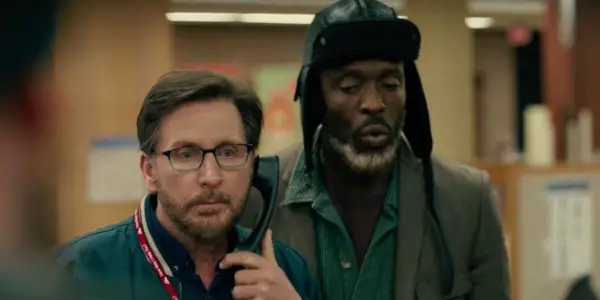Emilio Estevez’s The Public is bound to be one of the most overlooked films of the year. But it’s also likely to be one of the most original movies in recent memory. How many other films feature a standoff between police and homeless people inside of a public library?
A Creative Premise With a Powerful Message
In The Public, Emilio Estevez is stuck in a library once again. But compared to The Breakfast Club, things are much different this time around. Estevez directs, writes, and stars as Stuart Goodson, a librarian at the Cincinnati Public Library. A group of homeless people frequently visit the library, especially to escape from a particularly brutal winter. When a dangerous cold front moves in, the homeless library patrons refuse to leave the library at closing time. They stage a nonviolent sit-in that spirals into a standoff with local police. Michael K. Williams (The Wire, Boardwalk Empire) delivers a noteworthy performance as Jackson, the homeless man who leads the protest.

Stuart and fellow librarian Myra – played wonderfully by Jena Malone – get caught up in the middle of the action. In addition, detective Bill Ramstead (Alec Baldwin) and district attorney Josh Davis (Christian Slater) become wrapped up in the dispute as well. Through these characters, Estevez manages to make a statement about today’s political climate.
He also takes aim at the media through Gabrielle Union’s character Rebecca Parker, a news reporter. There’s a large cast of characters at play here, but they’re all so well-written that it’s easy to become emotionally invested and engaged in the storyline. Regardless of who the audience is rooting for, there’s enough substance to each character that it’s easy for viewers to understand the reasoning behind their decisions.
Librarians Are The Real Heroes
The idea of homeless people seeking shelter in public libraries isn’t a matter of fiction. In fact, Estevez’s inspiration for the film stems from the 2007 essay “Written Off” by Chip Ward, former assistant director of the Salt Lake City Public Library. When The Public screened at Cinequest in San Jose, Estevez was accompanied on stage by local librarian Jill Bourne, who vouched for the film’s authenticity. Librarians have essentially taken on the role of social workers and first responders for their patrons. They don’t get nearly as much credit as they deserve, and this film is a real eye-opener in that regard.
Changing How We Think About Homeless People
The Public is arguably heavy-handed in its message, but it’s one that demands to be heard. Last year, approximately 553,000 people in the United States experienced homelessness on any given night. The Public’s three-dimensional characters and thoughtful script work to encourage viewers to see homeless people from a new perspective. The depth of these characters is revealed at a gradual pace, encouraging viewers to reflect on how our initial judgments of others are often misguided. The film is an honest portrait of humanity, for better and for worse. Hopefully, The Public will inspire viewers to think twice before making assumptions about homeless people.
The Public also tackles issues pertaining to mental health, addiction, the distribution of wealth, authority, and the importance of community. The film revolves around a myriad of serious topics but maintains a lighthearted tone and is infused with plenty of humor. The result is a feel-good film that’s also timely and pertinent.
Despite its unique premise, The Public hits some very predictable beats. It also feels cheesy and mawkish at times. It’s easy to overlook these faults because the film is full of good intentions and has a lot of heart to boot. It also helps that the editing keeps the story moving at a quick enough pace so that it never loses steam or overstays its welcome. For viewers willing to see past the flaws, the film is ultimately a rewarding experience.
Conclusion: The Public
In an interview with The Washington Post, Estevez declares that he hopes the film “may inspire people to look at mental illness differently, at homelessness differently, to look at libraries differently, to actually go into a library.” The Public does all that and more. The film is a powerful reminder to be kind, put our biases aside, and appreciate all that our local libraries have to offer. It’s an amusing and eccentric film that provides a candid look at humanity. Despite its flaws, The Public is heartfelt, humorous, and enlightening.
Are you looking forward to seeing The Public? Let us know in the comments section!
The Public hits theaters in the U.S. on April 5, 2019. For all international release dates, see here.
Does content like this matter to you?
Become a Member and support film journalism. Unlock access to all of Film Inquiry`s great articles. Join a community of like-minded readers who are passionate about cinema - get access to our private members Network, give back to independent filmmakers, and more.